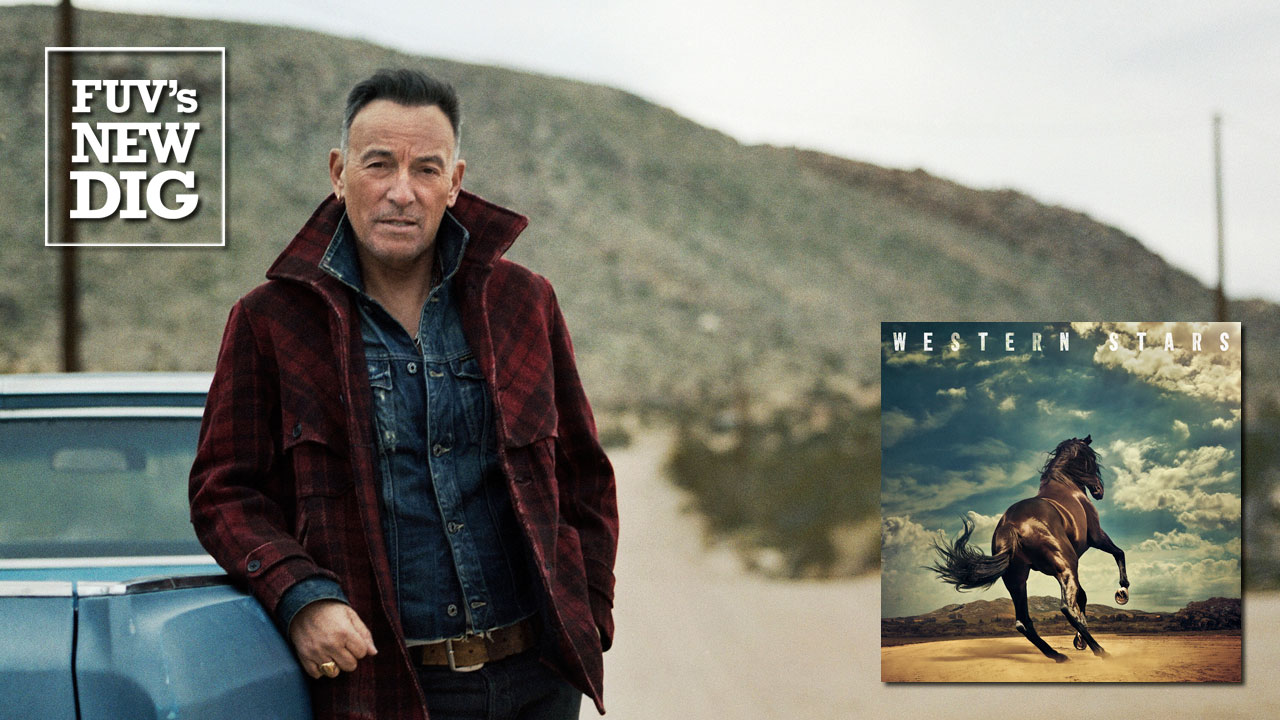Bruce Springsteen

Bruce Springsteen (photo by Danny Clinch, PR)
Bruce Springsteen
Western Stars
Columbia Records
The myth of the American West has always had a powerful allure for musicians — and Bruce Springsteen, who took his own road trip across plains and deserts, has recorded his own travelogue of his journey. His 19th studio album, Western Stars, is filled with character studies and life experiences from the coast closer to the Pacific.
This latest chapter in the unparalleled career of the Boss arrives in the aftermath of Springsteen's one-man stage show, his monologue with music called “Springsteen On Broadway,” which ran for over a year at New York's Walter Kerr Theatre.
In a press release, Springsteen describes Western Stars, his first studio release since 2014’s High Hopes and the American Beauty EP, as “a return to my solo recordings, featuring character-driven songs and sweeping, cinematic orchestral arrangements.” While it would be somewhat accurate to categorize Western Stars as one of Springsteen’s musical side jaunts, like Nebraska or We Shall Overcome: The Seeger Sessions, the album really isn't comparable to those release. Nor is it cut from the same cloth as Springsteen's best-known albums, like Born To Run or The River. Western Stars is, quite simply, unlike anything Springsteen has ever done.
Western Stars looks to the Southern California pop music of the late Sixties and early Seventies, and it’s on that melodic plane that Springsteen weaves his American tales in the West. His observations peer down highways and wander through isolated deserts. They are stories about community and hope, as well as solitude and loneliness.
The first two songs on Western Stars come from the perspective of a wanderer and hitchhiker, sampling the styles that form the backbone of the album. “Hitch Hikin’” has a light country flavor running through it, while “The Wayfarer” possesses a cinematic flair. The album’s title track tells the tale of an aging actor hanging on to past glories as his career nears its end.
Similarly, in "Drive Fast (The Stuntman)," Springsteen sings of a broken-down stuntman with “two pins in my ankle and a busted collarbone/A steel rod in my leg, but it walks me home.” The mood lightens with the strains of a Tex-Mex band playing on Friday and Saturday nights at “Sleepy Joe’s Café,” where “Monday morning’s a million miles away.”
“Sundown” is one of the album’s grand thematic songs, and it soars majestically straight off the silver screen. “Chasin’ Wild Horses” is another orchestral beauty complete with steel guitars that blow in the warm breeze across the dusty plains to the sunset.
“Hello Sunshine” recalls Harry Nilsson’s interpretation of Fred Neil’s “Everybody’s Talkin'’” or John Hartford’s “Gentle On My Mind,” as sung by Glen Campbell. The pop gem “There Goes My Miracle" incorporates a modern touch with its use of a drum machine. There's lyrical punches lifting the richly dramatic "Stones:" “I woke up this morning with stones in my mouth/You said those were only the lies you’ve told me."
No Americana album would be complete without a train song, and “Tucson Train” sees the Boss take to the rails, until it all slows down at the end of the day, at the “Moonlight Motel.”
Springsteen wrote all of the songs on Western Stars and he produced the album with Ron Aniello, who also co-produced 2012’s Wrecking Ball and High Hopes. Aniello also plays bass, keyboards and other instruments on the album. Patti Scialfa and Soozie Tyrell lend vocals, while Jon Brion, David Sancious and Charlie Giordano appear as well. Western Stars was mostly recorded at Springsteen’s home studio in New Jersey, but there was additional work done in California and New York.
It’s remarkable that after all that Springsteen has produced in his brilliant career, that he can still reach within himself to find a work as unique and satisfying as Western Stars.

